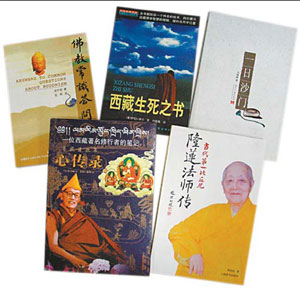Zen and the art of tourism
China has witnessed a flourishing book market on Buddhism in recent years with hundreds of new titles of publications appearing on the shelves. Zhang Min |
During this Spring Festival, the Shaolin Temple in Central China's Henna Province reportedly received at least 20,000 visitors while Yonghegong Lamasery in Beijing was flooded with at least 10,000 visitors on the first day of the Year of Pig.
"People of all ages come to buy these Buddhist books, CDs and DVDs of Buddhist music and Buddhist lectures," said Zhang Xiaohui, a salesgirl at one of the many shops opposite the Yonghegong Lamasery in downtown Beijing which sell Buddha statuettes, incenses, flowers, Tangkas and Buddhist literature.
"Artworks such as the Tangka give people inner peace," said Chodron Wangmo, deputy director of the Tibetan Folk Artists Association, who organized a successful show of Tangka paintings at the Jing'an Monastery during the Spring Festival in downtown Shanghai.
Buddhist artworks have also become a favorite with the collectors, many of whom are the newly rich Chinese, according to Fu Qian, a senior manager with Beijing Oriental Properties Auctions Co, the organizer of an upcoming Tibetan Buddhist Art Festival in Beijing in April.
In the major book malls in Beijing, patrons can find piles of books and other publications about Buddhism.
And from on-line bookshops such as dangdang.com, one can choose from some 4,000 items of books, CDs and DVDs from the Buddhist Culture category.
"Over the past years, many of my friends, white collars and university students, have become Buddhist believers," Ming Jie, a lay Buddhist since the 1990s and translator of American Sinologist Bill Porter's Road to Heaven: Encounters with Chinese Hermits.
Ming is now busy working on rearranging and annotating Zen Buddhist cannons and related interpretations by older generations of Buddhist masters for readers today.
Some restaurant owners in China also offer so-called Buddhist vegetarian cuisine. In Beijing alone, one can find at least 20 high-brow vegetarian restaurants decorated with Buddhist motifs and offering free handouts on Buddhism.
Buddhist culture has also gained a foothold in the cyberworld. "Long before Chen Xiaoxu's conversion captivated public attention, thousands of Chinese Buddhist believers had their blogs, e-communities and even independently-run websites on Buddhist culture," said Kou Yaqiang, a Buddhist and a professor at the China Conservatory of Music.
To promote Buddhism, the Buddhist temples as well as individual monks and nuns have opened their blogs and websites. And some are even learning more "worldly skills" to make it easier to mingle with people from different backgrounds.
Researcher Wang Zhiyuan said people in more developed areas, particularly the coastal areas, have a strong interest in religion, including Christianity and Buddhism than those in underdeveloped areas. "In the past, many impoverished Chinese spent their life in the temples in times of war and famine," Wang said. Today, many rich people turn to Buddhism for inner peace and comfort and some even take the tonsure.
China Daily
(China Daily 03/13/2007 page18)















